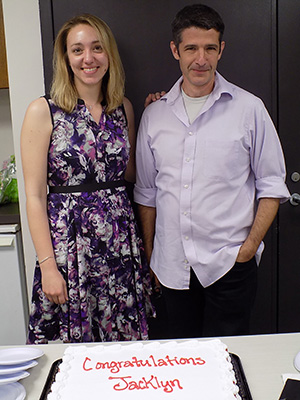
On June 25, 2019, Jacklyn Johnson defended his PhD thesis entitled, "Properties of HIV-1 Env and Human Seminal Fluid that Determine Virus Inhibition by Antibodies and Microbicides". Jacklyn appears with his mentor Dr. Hillel Haim.
Research
Human immunodeficiency virus type 1 (HIV-1) establishes a persistent infection that leads to acquired immunodeficiency syndrome (AIDS). Approximately 36 million people worldwide are living with HIV-1, which is commonly acquired through sexual contact. Antiviral therapies control disease progression, but do not eliminate this virus from the host. Thus, global efforts are focused on developing vaccines that prevent HIV-1 transmission. Such vaccines are based on eliciting antibodies that target the envelope glycoproteins (Envs) of this virus. Unfortunately, HIV-1 immunization trials have shown limited efficacy. A better understanding of the antibody-mediated inactivation process is needed to improve vaccine strategies.
In this work we describe two novel factors that contribute to HIV-1 inactivation by antibodies. First, we show that the structural stability of the Env protein determines its sensitivity to vaccine-elicited antibodies. Different interactions within Env contribute to its stability. Perturbation of these Env-stabilizing interactions by physical and chemical treatments enhances the sensitivity of HIV-1 to antibodies.
Second, we found that the chemical composition of the transmission medium affects Env inhibition by antibodies and other inhibitory agents. Semen is the most common vehicle for HIV-1 transmission. This medium contains high concentrations of the sugar fructose. We found that semen fructose competitively blocks binding of antiviral agents that target sugar residues on Env.
Together, this work advances our understanding of the mechanism that underlies HIV-1 inactivation by vaccine-elicited antibodies and provides novel strategies to enhance their potency.
About Jackie
Jackie was born and raised in Litchfield, MN as the youngest child of David and Tracy Johnson. Growing up, Jackie enjoyed helping her dad on the farm, playing with her older brother Jeremiah, camping with her family, and participating in several different sports, including soccer, swimming, tennis, and volleyball. Her interest in science began in high school under the mentorship of her biology teacher Bethany Ring, who taught her important anatomical differences between deer hearts and livers.
After high school, Jackie enrolled in Buena Vista University in Storm Lake, IA to pursue a degree in Biology. In 2011, she volunteered at a hospital in Migori, Kenya alongside her brother. They saw patients with a variety of microbial diseases, including malaria, yellow fever, and HIV-1/AIDS. The experience motivated her to explore a career in microbiology research. During the next two years of college, she performed research under the guidance of faculty advisor, Dr. Lenzmeier. Her projects focused on elucidating the effects of various antibiotics on cellular metabolic processes.
In 2013, Jackie joined the Department of Microbiology and Immunology graduate program. Her interested in HIV-1 research prompted her to join Dr. Hillel Haim’s lab. Under his mentorship, her work has focused on understanding the factors that impact the inactivation of HIV-1 by antibodies and other inhibitory agents.
Outside of the lab, Jackie enjoys planning excursions with her fiancé, John, around Iowa and surrounding states. She also enjoys visiting family, planning game nights, dabbling in art, woodworking, and relaxing with her friends over food and drinks.